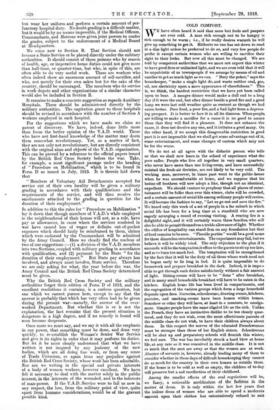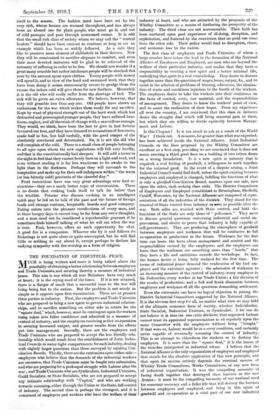COLD COMFORT.
have often. heard it said that none but fools and paupers are ever cold. A man rich enough not to be hungry is rich enough to be warm ; i.e., if he really desires warmth he will give up something to get it. Hitherto no one has sat down to read in a dim light unless he preferred to do so, and very few people do prefer it except certain women who are willing to sacrifice their sight to their looks. But now all this must be changed. We are told by competent authorities that we must not expect this winter to have good fires or unlimited light, and we are even told that it will be unpatriotic of us townspeople if we arrange by means of oil and candles to get as much light as we can. " Bury the poker," says the housekeeper, " make a single light do, and waste neither coal, gas, oil, nor electricity upon a mere appearance of cheerfulness." This is, we think, the hardest restriction that we have yet been called upon to bear. A meagre dinner would make a dull end to a long day if it were the end, but after dinner beside a good fire and a good lamp we were last cold weather quite as content as though we had eaten better. Poor food, a poor fire, and a bad light form a depress. ing prospect. It is better to face it in all its dimness. When people are willing to make a sacrifice for a cause it is no good to assure them that they will find it a pleasure. It does not enhance the cause, it does not deceive any one, and it irritates a good many. On the other hand, if we accept this disagreeable restriction in good part it is not impossible that we shall get some advantage out of it, some entertainment, and some changes of custom which may not be for the worse.
We do not at all agree with the didactic person who tells us that we shall now learn in the school of experience what the poor suffer. People who live all together in very small quarters, who never have more than one living-room, and have successfully resisted the fresh-air doctrine, are not likely to be very cold. The working man, moreover, in times past went to the public-house when he was uncomfortable at home, and we suppose that his better-off brethren will now adopt a like, though not an identical, expedient. We should venture to prophesy that all places of enter- tainment will be fuller than ever this winter, clubs will be crowded, and a certain amount of social life among ordinary peoplewill revive. It will become the fashin to say, "Let us go out and save the fire." We heard only this week of a set of people in a far suburb in which social life has been for a long time at a standstill who are now eagerly arranging a round of evening visiting. A roaring fire is a delightful sight, and it will certainly warm three families, who will also be able to permit themselves a treble allowance of light. Whether the edifice of hospitality can stand firm on any foundation but that of food remains to be seen. "Fireside parties" would be a good name for these dinnerless entertainments. The experiment may fail, but we believe it will be widely tried. The only objection to the plan if it succeeds will be the temptation it offers to the guests to sit up too late, and so to burn too much fuel. The temptation will be strengthened by the fact that it will be the duty of all those whose work need not be begun early to lie long in bed. It is quite impossible to do housework and prepare breakfast in the dark. Indeed, it is impoc- Bible to get through such duties satisfactorily without a fair amount of light. Sitting-rooms will have to be " done" after breakfast, and in many small households breakfast will have to be eaten in the kitchen. English home life has been lived in compartments, and the segregation of the various groups which form a large household depends upon fires. Nurseries, schoolrooms, drawing-rooms, kitchens, pantries, and smoking-rooms have been homes within homes. Somehow or other they will have, at least in a measure, to amalga- mate. Simpler people have the same ideal of life as the rich. Unlike the French, they have an instinctive dislike to be too closely quar- tered, and they do not wish, even the most affectionate parents of the middle class do not wish, to have their children always about them. In this respect the nerves of the educated Frenchwoman must be stronger than those of her English sisters. Schoolrooms will be shut up and preparatory schools will flourish this winter, we feel sure. The war has inevitably struck a hard blow at home life, at any rate as it was conceived in the middle class. It is not so much that the men are away as that the women are at work. Absence of servants is, however, already leading many of them to consider whether in these days of difficult housekeeping they cannot do as much for the country in their own houses as outside them. If the home is to be cold as well as empty, the children of to-day will preserve but a sad recollection of their childhood.
Among the smaller effects of the coal regulations will be, we fancy, a noticeable modification of the fashions in the ins.tter of dress. It is only within the last few years that the indoor dress of women who are able to spend a moderate amount upon their clothes has ostentatiously refused to suit
itself to the season. The fashion must have been set by the very rich, whose houses are warmed throughout, and has always been an absurd one for plain people, who must go in and out of cold passages and pass through unwarmed rooms. It is odd that the small rich class of society whom we may call the " central heaters " should have been content to continue so long to set an example which has been so widely followed. As a rule they like to preserve more element of shibboleth in their decrees. Now they will be constrained to sacrifice elegance to comfort, and even their most devoted imitators will be glad to be relieved of the necessity of suffering in order to be fine. We should not wonder if a great many sensible but rather intolerant people will be shocked this year by the amount spent upon clothes. Young people with money will spend it, and in view of the hard and sustained work that they have been doing it seems unnecessarily severe to grudge them the excuse the indoor cold will give them for new feathers. Meanwhile it is the old who will really suffer from the shortage of fuel. The sick will be given an extra allowance. We believe, however, that they will grumble less than any one. Old people have shown an enthusiasm for the war which makes them ready for any sacrifice. Kept by want of physical strength out of the hard work which has distracted and preoccupied younger people, they have suffered lone- liness, neglect, and all the trials of change with a marvellous courage. They would, we think, have been the last to give in had fortune favoured our foes, and they have listened to accusations of fierceness, made half in fun, but half ruefully, with the good temper of the absolutely convinced and determined. No, it is not the old who will complain of the cold. There is a small class of people belonging to all ages upon whom the new regulations will fall very hardly, and that is the constitutionally bad sleepers. It will add a terror to the night to feel that they cannot freely turn on a light and read, and even without reading it is far less wearisome to lie awake in the light than in the darkness. Perhaps they will succumb to the temptation and make up for their self-indulgence within " the warm [or less bitterly cold] precincts of the cheerful day."
Food restrictions have one very great advantage over fuel re- strictions—they are a much better topic of conversation. There is no doubt that cooking lends itself to talk fax better than the weather. Persons who discuss cooking in an intelligent spirit may be led on to talk of the past and the future of foreign lands and strange customs, hospitable boards and good company. Eating enters into the pleasant recollections of every man, and in these hungry days it cannot long be far from any one's thoughts, and a man need not be considered a reprehensible gourmet if he sometimes finds himself talking of what he will eat when the war is over. Fuel, however, offers no such opportunity for chat. A good fire is a companion. Whoever sits by it and follows its ffickerings is not quite alone or quite unoccupied, but he will find little or nothing to say about it, except perhaps to declare his undying sympathy with fire-worship as a form of religion.



























 Previous page
Previous page